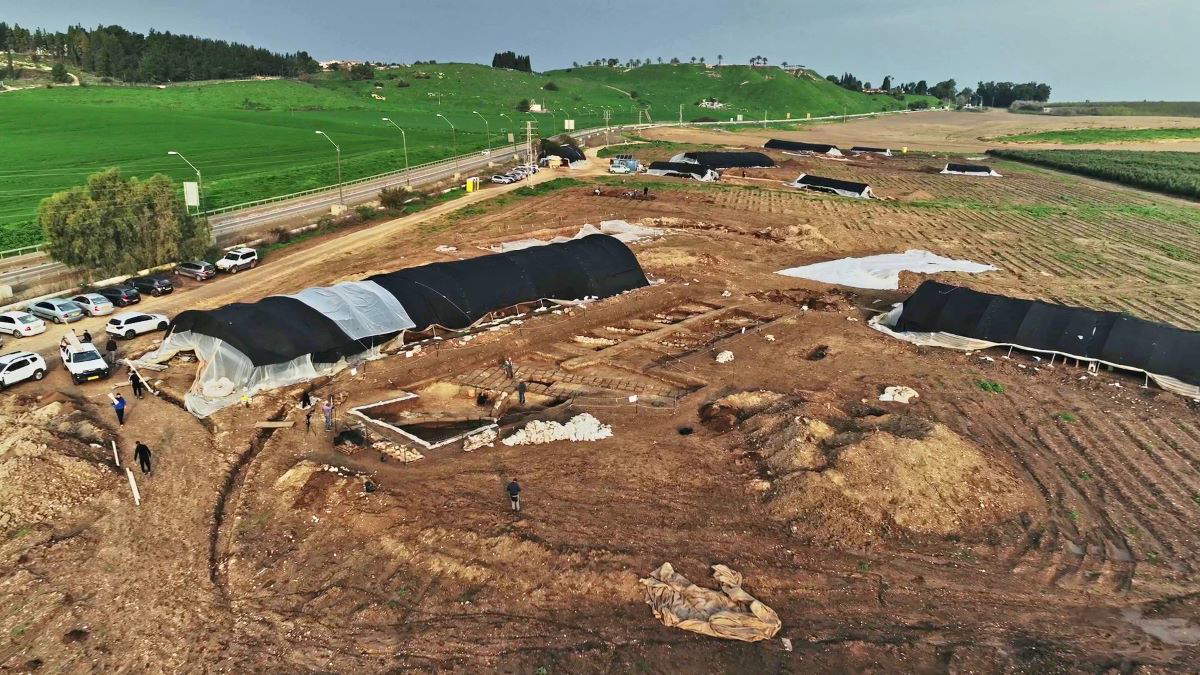Artifacts from the 1,800-year-old military base of the 6th Roman Iron Legion were unearthed in a recent excavation in Israel, conducted by the Israel Antiquities Authority at an excavation near Tel Megiddo, below the village of Kfar Othnay, during work on a new road infrastructure. Archaeologists Yotam Tepper and Barak Tzin directed the excavations, revealing the architectural remains of the Praetorian Way the main road of the encampment, and the remains of a large monumental public building. The Roman base of the 6th Legion is the only Roman military base of this size to have been located and unearthed in the Land of Israel. Tepper also pointed out that the discovery of the legionary base is the result of archaeological surveys and excavations conducted as part of the Jezreel Valley Research Project (JVRP) over the past decade. The project, directed by Tepper and Matthew J. Adams, is an academic initiative for historical-geographical research. During the excavations, various artifacts such as coins, weapons, pottery, and glass were found, with special emphasis on tiles. Preliminary surveys with Ground-Penetrating Radar suggest that the entire Roman base lies under the fields of Kibbutz Megiddo, so authorities will assess the preservation of the site and the fate of Road No. 66.
“The Roman Legio legion camp was the permanent military base for more than 5,000 Roman soldiers for more than 180 years, from 117-120 to about 300 A.D.,” explains Dr. Yotam Tepper, director of excavations on behalf of the Israel Antiquities Authority. “Two main roads intersected at the center of the camp, 550 m long and 350 m wide, and its headquarters was erected here. From this base point all distances along the Roman imperial roads to the main cities in the north of the country were measured and marked with milestones. The remains of the ancient building have not been preserved in height, as most of the building stones have been removed over the years to be reused in building projects carried out during the Byzantine and early Islamic periods.”
“Over the course of the excavation seasons, the upper part of the commanders’ courtyard (principia) was uncovered to the southwest of Road No. 66, and in the current excavation, conducted on behalf of the Israel Antiquities Authority, we are uncovering the northeastern part of the encampment extending along Road No. 66.”
“The unique contribution of the results of this research project lies in the rarity of such archaeological discoveries,” Tepper says. “Although Roman military encampments are known in Israel, they are either temporary siege camps or small encampments belonging to auxiliary divisions. None compares with the entire legionary base complex as brought to light in the archaeological excavations at Legio, near the Megiddo junction.”
“Historical sources and some partial information indicate the existence of a permanent Roman legionary base of the 10th Legion ’Fratensis’ in Jerusalem, but the encampment is yet to be discovered.”
“The tiles, some of which bore the stamps of the VI Legion, were used for various purposes, to cover buildings, create pavements and cover walls. The technology and know-how, construction techniques and weapons that the Legion brought with them from their home country are unique to the Roman army and reflect specific Roman imperial military imprints.”
“The proximity of the Roman Legionary base to Megiddo National Park, recognized as a World Heritage Site, and also to one of the world’s earliest known Christian prayer rooms, discovered by the Israel Antiquities Authority within the Megiddo Prison complex, offer potential to enhance the tourist experience at this central location at the gateway to the Galilee,” says Eli Escusido, director of the Israel Antiquities Authority.
Pictured are the excavations. Photo: Emil Algam
 |
| Israel, remains of 6th Roman Legion military base discovered |
Warning: the translation into English of the original Italian article was created using automatic tools. We undertake to review all articles, but we do not guarantee the total absence of inaccuracies in the translation due to the program. You can find the original by clicking on the ITA button. If you find any mistake,please contact us.